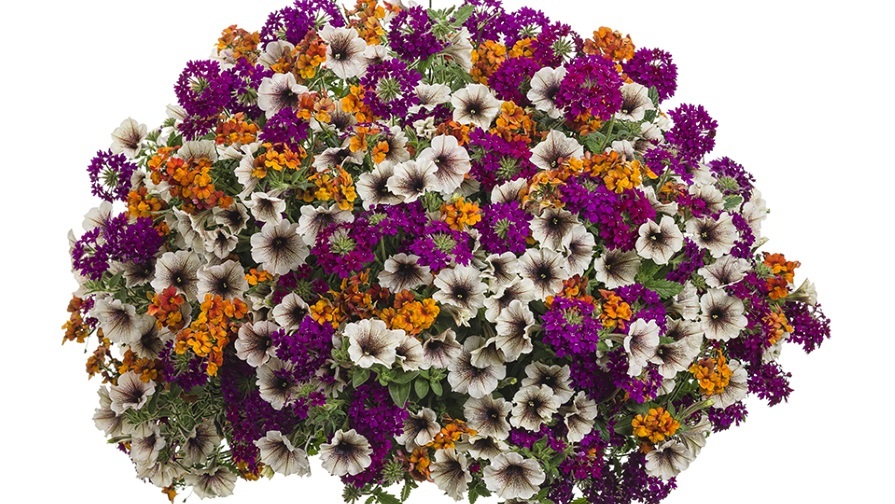Moving Beyond Blue Carnations
It was only a matter of time before flowers became the next frontier for biotechnology, and now it has happened. In a joint venture between German-based Selecta Klemm and U.S.-based Mendel Biotechnology Inc., transgenic ornamental plants are only a few years away.
The new entity, Ornamental Bioscience (www.Ornamental-Bioscience.com), combines Mendel’s technological expertise and patent estate in drought, cold and freeze tolerance, disease resistance and flower stability traits, with Selecta’s experience in plant transformation technology, its extensive variety patent estate and experience in marketing ornamentals worldwide.
Christian Klemm, CEO of Ornamental Bioscience, says it is time for the ornamental market to catch up to other areas of agriculture that have already made strides–and profits–in transgenic crop production and marketing.
“We envision the ornamental market will undergo substantial development in the coming decade,” Klemm says. “The global market for ornamentals has an annual retail value of several billion dollars. Ornamental Bioscience will apply modern biotechnology to substantially improve the characteristic traits for producers and consumers to bring us premium positioning in this market.”
While genetically modified (GM) food crops, nicknamed “Frankenfoods” by opponents, came under massive scrutiny in the ’90s and into the 21st century, Klemm says he does not expect the same consumer backlash will occur regarding transgenic ornamental crops.
“Food that we eat is a totally different story from an ornamental plant that we enjoy only looking at,” Klemm says. “So, if there was a risk level with genetically modified organisms in general, it is certainly on a very different level for food versus ornamentals. The GM food on the market today mainly gives benefits to producers. Ornamental Bioscience is developing ornamental plants with a strong focus on consumer, trade and producer traits. Our product will be presented to the consumer as a premium product indicating the extra value that makes them more tolerant and better performing.”
Selecta has been active in biotechnology since 1996, when the company cooperated in developing a blue carnation with Florigene in Australia, Klemm points out. To date, blue carnations are the only transgenic ornamental plants that are produced and distributed worldwide.
“I have not heard about negative consumer reactions to the blue carnation and the product is sold at a price about three times that of an average carnation,” Klemm says. “In Germany, where consumers are very critical, I have heard about two occasions where the blue carnation was presented to consumers indicating the use of biotechnology, with no negative reaction from the public.”
Why Biotech?
So with all the varieties on the market, why go biotech? Klemm says transgenic science applied to ornamental crops will bring benefits to entire plant species.
“Conventional breeding is too slow to reach significant results on targets like cold, freeze, drought or disease resistance,” he says. “Results through breeding could sometimes ask for decades of work.”
Klemm adds Ornamental Bioscience will apply a combination of two technologies, first using biotechnology to “switch on” genes that already naturally exist in the plant, enabling the desired tolerances.
“In the original plant these genes are only ‘switched on’ under certain climatic conditions,” he says. “We try to keep them turned on constantly. Once we get a good result, we go back to a traditional breeding program to improve other traits of the plant like colors, growth, earliness and so on.”
In addition, worldwide issues like global warming and worsening water restrictions create the need for transgenic technology in the landscape, Klemm says.
“We can see daily in the news how climate change becomes a more realistic issue,” he says. “Only a few years ago it still seemed a philosophic discussion between scientists and lobbyists. Certain geographic areas will see more restrictions on the use of water in the coming years.”
Change Is Coming
Currently, Ornamental Science is working exclusively on crops from the Selecta product range, transforming petunias, poinsettias, New Guinea impatiens and geraniums, and Klemm says he expects to see the first transgenic poinsettias and petunias to come on the market within four to six years. Beyond that, the product range will be greatly expanded, he says.
“We believe that this technology has an exciting future and we intend to contribute to its acceptance as an industry standard,” he says. “As part of this strategy, we will cooperate with leading breeders and distributors for pot plants and cut flowers.”
Klemm adds he fully expects competition in the transgenic ornamental crops in years to come.
“I am sure this is just a question of time, as well as availability and access to the right technologies,” he says. “Ornamental Bioscience is giving an answer to very relevant requirements of the future and I am certain that we will not be the only company to address these needs. Consumers are looking for premium products with better performance.”
But consumer demand is just the tip of the iceberg, Klemm says. From the breeder’s and grower’s point of view, he says constantly increasing competition has bred strong demand for improvement, and Ornamental Bioscience hopes to help in that area.
“Ornamental Bioscience technology will give better patent protection for the breeders against copy breeding,” he says. “The products will also be able to open new markets for producers to offer products in territories or seasons were they cannot be offered today due to the product characteristics.”
Selecta First Class, as the exclusive sales organization for Selecta products in the North American market, may be a sales channel for Ornamental Bioscience products, but it is still to early to say, Klemm says.
“The business model of Ornamental Bioscience is different from the one of the existing Selecta products. Sales and marketing will be developed according to the needs of Ornamental Bioscience products.”
Mendel Biotechnology has licensed its technology exclusively to Ornamental Bioscience for the ornamental market, and is a significant minority shareholder in the company. Mendel has partnered with other agricultural and forestry companies to commercialize improved seed and plant products, and is also developing new products for the emerging bioenergy market.










